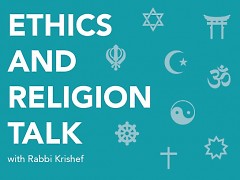Fred Stella, the Pracharak (Outreach Minister) for the West Michigan Hindu Temple, responds:
“I am always proud to join my fellow clergy when there is an opportunity to speak out if we can come to a consensus on matters of social justice. I am fortunate that in my position with the West Michigan Hindu temple I am given a great deal of freedom to express myself in these matters. I know that I cannot pretend to speak for our entire congregation when I do so; but I feel confident that there is always strong support behind me. Besides my affiliation with the temple I have the privilege of serving on the National Leadership Council of the Hindu American Foundation. It is there that I am often introduced to important issues that require advocacy which reflects Hinduism’s value of family, nonviolence, rule of law and compassion. There my voice is amplified a thousand fold.”
Father Kevin Niehoff, O.P., a Dominican priest who serves as Adjutant Judicial Vicar, Diocese of Grand Rapids, responds:
“Although it is philosophically fallacious to answer a question with a question, I am going to violate this intellectual principle here to make a point. Instead of framing this question around clergy who have publicly criticized the President on this issue, maybe we need to look at the question more in terms of: what is the Holy Spirit trying to teach us through these individuals?
“I suspect people who profess to be Christian are being challenged to not simply look at immigration as a violation of law. To this end, there is a meme going around on Facebook (older people ask your children and grandchildren what this means) that states, ‘the people who shielded Anne Frank were violating the law. The people who killed Anne Frank were following the law.’
“There are many challenges in the world today. Individuals are illegally entering the United States to seek the American dream (life, liberty, and the pursuit of happiness). The threats the individuals experience in their home countries are still far less severe than what is occurring at the border of the United States. Do we, who profess to believe in one God, have the courage to seek a solution for all, or do we simply wish to treat individuals in ways that are selfish, ideological, commercial, or totalitarian (cf. the Seventh Commandment of the Decalogue)?”
The Reverend Colleen Squires, minister at All Souls Community Church of West Michigan, a Unitarian Universalist Congregation, responds:
“I do not know of any faith where it is acceptable to separate a toddler from their parent or family. I think any clergy that has chosen to remain silent on this issue has chosen incorrectly. This issue is not about being anti-government it is about standing up for the least able to stand up for themselves. Any suffering that a child is made to endure at the hands of our government should be unequivocally condemned. I feel as a minister I am morally and ethically compelled to speak up when my government has implemented a horrible and heartbreaking policy or action.”
Rev. Ray Lanning, a retired minister of the Reformed Presbyterian Church of North America, responds:
“Every Presbyterian minister must speak and act with a conscience captive to the written Word of God. That means that every preacher must be able to show in any sermon that (1) he has rightly understood the teaching of Scripture, and (2) faithfully and justly applied it to the needs of his hearers. We are not free to express our own opinions or private judgments when we speak in the name of the Lord Jesus Christ.
“Just as some doctors treat only symptoms and not the root causes of disease, so some preachers take aim at the evils of the times and do not strike at the root causes of those evils. It is a waste of precious time merely to rail against the evils of the day. It is much more important to ground our hearers in the mind of Christ as revealed in Scripture, and let that mind guide those hearers in doing their duty to their fellow human beings. Men and women armed with ‘the sword of the Spirit, which is the Word of God’ (Ephesians 6:17) have changed the course of history many times.”
My response:
I ask myself, can I live with myself knowing that I did not speak up and share my understanding of Torah on this issue? In this case, the violation of our principles was so egregious that I could not keep silent so I shared a position paper, supported by nearly every major Jewish organization, condemning the policy of family separation.
This column answers questions of Ethics and Religion by submitting them to a multi-faith panel of spiritual leaders in the Grand Rapids area. We’d love to hear about the ordinary ethical questions that come up on the course of your day as well as any questions of religion that you’ve wondered about. Tell us how you resolved an ethical dilemma and see how members of the Ethics and Religion Talk panel would have handled the same situation. Please send your questions to [email protected].
The Rapidian, a program of the 501(c)3 nonprofit Community Media Center, relies on the community’s support to help cover the cost of training reporters and publishing content.
We need your help.
If each of our readers and content creators who values this community platform help support its creation and maintenance, The Rapidian can continue to educate and facilitate a conversation around issues for years to come.
Please support The Rapidian and make a contribution today.
